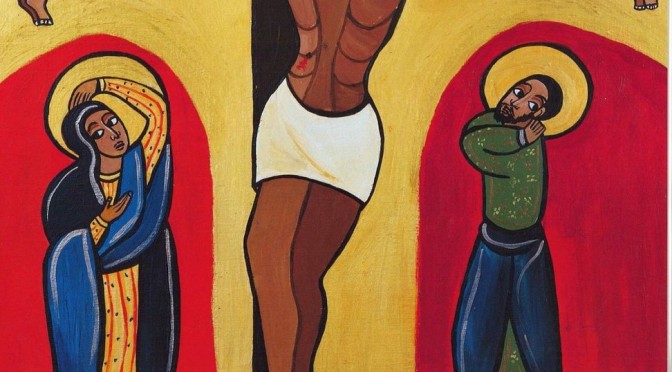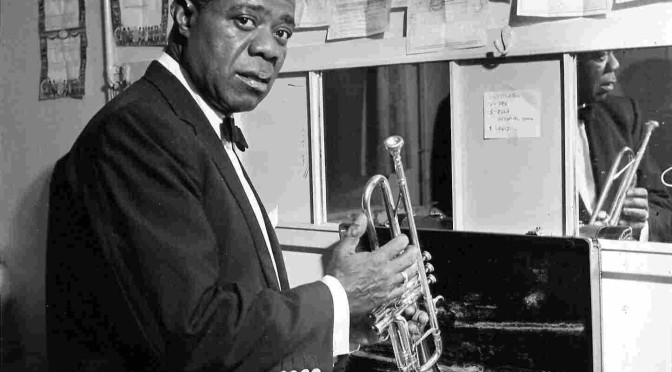**sermon art: The Crucifixion with Jesus Mother and the Beloved Disciple by Laura James.
Pastor Caitlin Trussell with Augustana Lutheran Church on March 29, 2024
John 18 and 19 – read the whole thing elsewhere if you’d like – sermon begins after this brief excerpt:
John 19:17–18, 25b–27 So they took Jesus; and carrying the cross by himself, he went out to what is called The Place of the Skull, which in Hebrew is called Golgotha. There they crucified him, and with him two others, one on either side, with Jesus between them.
Meanwhile, standing near the cross of Jesus were his mother, and his mother’s sister, Mary the wife of Clopas, and Mary Magdalene. When Jesus saw his mother and the disciple whom he loved standing beside her, he said to his mother, “Woman, here is your son.” Then he said to the disciple, “Here is your mother.” And from that hour the disciple took her into his own home.
[sermon begins]
How are we to understand the goodness of Good Friday? A violent execution seems an odd thing to commemorate much less celebrate, especially in a time when the world is wrestling with disturbing violence and deep pain. It’s really important today to understand that it’s not the violence of the cross that is redemptive. It’s not the pain of Jesus that saves us. It’s easy to get lost in the message of the cross because the earliest Jesus followers who wrote down their experiences couldn’t quite figure it out either.
The goodness of Good Friday has to do with God. More specifically, the goodness of Good Friday has to do with who God is in Jesus. The Gospel of John argues that God is Jesus and Jesus is God. The love of God in Jesus, the audacity of grace personified in Jesus, the ultimate power of that love, so enraged his enemies and fueled the mob mentality that ultimately killed him. Jesus ate meals with unlovable people, he had public conversations with women no one spoke to, and he had secret conversations with religious leaders who opposed him by day. The list of his ever-expanding circle of grace and love is endless. Finally, when the threat of his grace, the threat about who is included in the love of God, became too great, he was killed for it. Grace and unconditional love were just too threatening. When Jesus predicted his death, it was the inevitable end that could be anticipated. Hate’s last gasp, if you will, because love is the greatest power and hate will always try to do away with it.
The goodness of Good Friday reminds us that we are not left alone in suffering. God suffers with us. God absorbs our suffering into God’s heart. Good Friday also tells the truth about suffering caused by violence. Large acts of violence are obvious. There are also the smaller acts of violence that destroy relationships and murder people’s spirits and our own spirits – lies, gossip, passive aggression, dissing someone’s body rather than debating their ideas or confronting their hurtful behavior…the list of our violent ways is as endless as we are creative in inflicting ourselves against the ones we love and the ones we hate. The level we inflict suffering on each other, and on the earth and all its creatures, knows no bounds.
The goodness of Good Friday reminds us that the cross is the place where we struggle in the darkness and the very place where God meets us. We live in this darkness in different ways – failure, addiction, confusion, doubt – our darkest places that we don’t tell anyone about. Most of us are capable of just about anything given the right set of circumstances. The goodness of Good Friday isn’t about pointing away from ourselves at other people who cause suffering. It’s also a sacred space to wonder and confess the pain that we cause as well.
Confessions of sin extend to systems that we’re a part of – institutions, countries, governments, families, friendships, communities, etc. Systems that hold us captive to sin from which we cannot free ourselves. What does free us? Jesus on the cross. Jesus on the cross holds up a mirror in which we can see our own reflections. Reflections that reveal the sin we inflict on each other and cannot justify. Oh sure, we try riding that high horse, cloaking our sin in self-righteousness. But the cross tells us otherwise. The cross also surprises us with grace in the face of sin.
We often act without awareness of how our actions may hurt someone else. That’s why our worship confessions talk about things we’ve done and things we’ve failed to do. That’s why we talk about our sin. Sin gives us language for the way we hurt other people and ourselves with our actions – actions that separate us from each other and God. Good Friday’s goodness creates space to experience life-giving compassion from the heart of God in the face of our sin. God’s SELF-sacrifice in Jesus also reminds us that Jesus’ death isn’t payment to an angry God or a hungry devil. That’s just divine child abuse. Jesus is a revelation of the goodness of God, taking violence into himself on the cross, transforming death through SELF-sacrifice, and revealing the depth of divine love.
God reveals the truth of our death dealing ways while reminding us that God’s intention for humankind is good.[1] Jesus was fully human and fully divine. His life’s ministry and his death on the cross reveal our humanity and the goodness for which we were created. The cross awakens that goodness. Jesus’ full and fragile humanity was displayed on the cross. He sacrificed himself to the people who killed him for his radical, excessive love. He would not raise a hand in violence against the people and the world that God so loves. Jesus’ self-sacrificing goodness clears our eyes to see God’s intention for our human life together.
Our connection with each other is also revealed in the goodness of Good Friday. From the cross, Jesus redefined connection, kinship, and companionship. Hear these words again from the gospel reading:
“Meanwhile, standing near the cross of Jesus were his mother, and his mother’s sister, Mary the wife of Clopas, and Mary Magdalene. 26When Jesus saw his mother and the disciple whom he loved standing beside her, he said to his mother, “Woman, here is your son.” 27Then he said to the disciple, “Here is your mother.” And from that hour the disciple took her into his own home.” [2]
From the cross, with some of his last breaths, Jesus did this incredible thing. It’s amazing. Jesus connects people through suffering. This is not a reason for suffering. Simply one truth about it. When we suffer and feel most alone, Jesus reaches out from his own suffering to remind us that we have each other. God’s heart revealed through the cross destroys the illusion of our aloneness and connects us to each other once more. In God we live and move and have our being through God’s goodness in Jesus on the cross. In each other, we’re given kinship and appreciation for the gift and mystery of being alive.
In the end, the cross isn’t about us at all. It’s about the self-sacrificing love of Jesus who reveals God’s ways to show us the logical end of ours – our death-dealing ways in the face of excessive grace and radical love. We struggle to believe that God applies this grace and love to everyone. It’s hard enough to believe that there’s a God who loves us. It’s downright offensive that God loves our greatest enemy as much as God loves us. But that is God’s promise in the goodness of Good Friday. There is nothing you can do or not do to make God love you any more or any less. God loves you through the cross, in the darkest places that you don’t tell anyone about. Nothing can separate us from the love of God in Christ Jesus.[3] God’s arms are opened to all in the outstretched arms of Jesus on the cross, receiving us by God’s reckless grace because God is love.[4] The goodness of Good Friday is that God loves us. God loves you. Amen.
__________________________________________________
[1] Genesis 1:26-31 God creates “humankind.”
[2] John 19:25b-27
[3] Romans 8:38-39
[4] 1 John 4:7-21


![What’s Your Longing of Faith? [OR Making It Through the Day] Hebrews 13:1-8, 15-16 and a teaser from Luke 14:1, 7-14](https://caitlintrussell.org/wp-content/uploads/2017/10/A-Cubist-Prayer-One-World-One-God.painting-by-Anthony-Falbo.sermon-Caitlin-Trussell-672x372.jpg)
![God Loves the People We Can’t [OR Jonah Slimed and Steaming] Jonah 3:1-5, 10; Mark 1:14-20, and 1 Corinthians 7:29-31](https://caitlintrussell.org/wp-content/uploads/2018/01/Pieter_Lastman_-_Jonah_and_the_Whale-1621.-sermon-Caitlin-Trussell-672x372.jpg)


